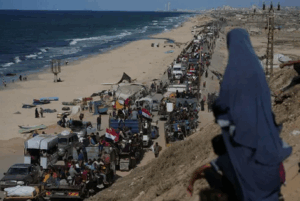Israel bets on a dangerous Gaza plan that has no basis in reality

Displaced Palestinians ride on trucks loaded with belongings as they travel along the coastal road near Wadi Gaza in the central Gaza Strip, moving toward Gaza City, 11 October 2025
Yigal Levy writes in Haaretz on 12 October 2025:
Israel has agreed to a dangerous plan: The Gaza Strip will become a territory without sovereignty, controlled partly by a multinational force that will be responsible for disarming Hamas.
There is no such thing anywhere in the world. International efforts to disarm hostile combatants have only succeeded under exceptional conditions: as part of a comprehensive peace agreement (Northern Ireland), by giving rebels an incentive to surrender their arms (Mozambique), disarmament in exchange for political integration (El Salvador), or after unconditional surrender (Germany).
These conditions do not exist in Gaza: There is no comprehensive agreement, no stable political structure, and Hamas has no real incentive to surrender its weapons. The Trump model has no basis in reality.
In the coming months, hundreds of thousands of internally displaced Gazans will return to their homes, exhausted and seeking peace, but more than a few also seeking revenge. They will meet a multinational force tasked with disarming Hamas and preventing other local groups from arming.
It’s doubtful they will obey a government they did not choose, especially when it is unclear who will protect them and when the Palestinian Authority, the sole semi-legitimate sovereign, is excluded from the process until it passes a series of tests set by the American-led coalition.
In the meantime, Gazans will have to make do with a technocratic committee subordinate to a foreign high commissioner (perhaps former British Prime Minister Tony Blair). They will crowd into the Strip, part of which is under long-term Israeli control as part of the “perimeter.”
There is little chance that Hamas, which remains on its feet, will cooperate with this framework, but even if it does, there is a reasonable chance that armed militias that are not bound by the Netanyahu-Khalil al-Hayya understandings will emerge under it.

Israeli Chief of Staff Eyal Zamir and US Special Envoy to the Middle East Steve Witkoff speak during a field tour in the Gaza Strip, 11 October 2025
It is a typical plan drafted by American businessmen who believe in sociopolitical engineering. But the recipe is problematic, requiring 2 million people who have been stripped of their humanity and sovereignty to obey a foreign regime.
From an Israeli perspective, it’s a potential security failure: creating a border with a hostile but non-sovereign territory that is controlled by a multinational force with no motivation to confront those who oppose it. When this force struggles to enforce the disarmament of Hamas and the other organizations, Israel will face a dilemma: to restrain itself or to resume the war and attack areas in which a multinational force is deployed, which will separate Israel and the Gazans.
To be honest, destroying Gaza and instilling a desire for revenge in its residents is a recipe for military disaster, not to mention a moral crime. In the face of this, the only alternative that might have had a chance was not considered, even if it is far from the illusion of destroying Hamas that the Israeli leadership has sold to its citizens.
This is the plan of former Palestinian Prime Minister Salem Fayyad, who proposed integrating Hamas into the PLO to form a new and more legitimate government for the Palestinian Authority, which would be given control of Gaza. The reformed Palestinian Authority would be the foundation for establishing a Palestinian state. Only if Hamas is part of a future solution, Fayyad argued, could any Palestinian commitment to nonviolence be credible.
Israel not only failed to promote such a plan, it refuses to act in its own clear interest and release from prison Marwan Barghouti, the most popular leader in Gaza according to a poll conducted before October 7, 2023, who could potentially lead a more credible political process.
Israel says “no” to what might provide stability and chooses a path that endangers its security more than any other alternative.
This article is reproduced in its entirety
